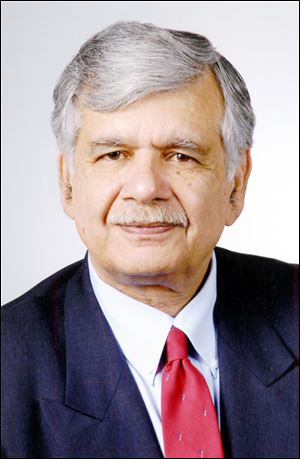
Bernard Lewis was an important, but flawed, academic mind
6/3/2018
Dr. S. Amjad Hussain.
On May 19, the famous historian and academic Dr. Bernard Lewis passed away at the age of 101. He was widely known as a scholar of Islam. Through the sheer force of his personality and the weight of his scholarship, he made a place for himself in the academic world where his ideas about Muslims and the Middle East resonated with the George. W Bush administration.
He theorized that Islamic civilization had been declining and decaying for centuries, and this decline was the catalyst for several key figures. According to the New York Times, he provided critical intellectual linkage between the religious fundamentalism of Osama bin Laden, which he said was a response to oppressive Arab regimes, and the secular despotism of Saddam Hussein. He envisioned democracy to be the only antidote for both. He predicted the destruction of the West at the hand of those forces if freedom was not brought to the Arabs. He coined the phrase the “clash of civilizations” for his theory.
He was an ardent supporter of the invasion of Iraq in 2003. The Bush administration sought his advice and government officials parroted his views on the Middle East on talk shows and in the print media. Unfortunately, his prediction that the Iraqis would welcome and American forces with open arms did not happen. Fifteen years later, Iraq has not recovered from that ill-conceived idea championed by Mr. Lewis.
According to Mr. Lewis, Islam had, at one time, offered comfort and peace of mind to millions of men and women by delivering dignity and meaning to their drab and impoverished lives, and inspired a great, inclusive civilization that enriched the world. He harshly described contemporary Arab states as a “string of shabby tyrannies.” He compared Saudi fundamentalists to an imagined scenario where the Ku Klux Klan controlled the oil revenues in Texas.
Mr. Lewis was an ardent supporter of Israel and believed Palestinians had no claim to a state. His writings on the subject became a required reading for the Israeli cabinet in the mid-1970s.
He had many detractors in the academic world. The late Edward Said, professor of literature at Columbia and a public intellectual, called Mr. Lewis a lobbyist and a propagandist for Eurocentric views who distorted the truth and hid his politics under the veneer of scholarship. Mr. Said was of the opinion that many Western scholars perpetuated the West’s patronizing representation of the East.
But Mr. Lewis had a retort for his critics when he wrore derisively that, “If Westerners can not legitimately study the history of Africa or the Middle East, then only fish can study biology.”
There were others who also criticized Mr. Lewis for his skewed ideas about Islam. Alan Wolfe, a political scientists and a sociologist from Boston College, called his views about Islam “belligerent.” Columbia historian Richard Bulliet, who specializes in the history of Islamic society and institutions, thought Mr. Lewis “looked down on modern Arabs and considers them good and worthy only to a degree they follow a Western path.”
While his work as an expert on the Middle East had its critics, his work on Turkey was considered monumental. His 1961 book, The Emergence of Modern Turkey, is still considered a classic scholarly work.
Countries in the East have different cultures and different histories. There is no guarantee that every country can or will respond to the mantra of democracy as propagated by the West. Iraq and Afghanistan are two glaring examples where imported democracy has not worked.
Bernard Lewis was a giant in the academic world. He promoted Western, Eurocentric views. He envisioned a transformed Middle East, with the greater Arab/Muslim world remade in the image of Western democracies. But even as he readily found faults in Arab/Muslim societies, he was willing to side-step the enduring effects of Western imperialism, American interventionism, and Israeli displacement of Palestinians as the cause of the Middle East turmoil.
S. Amjad Hussain is an emeritus professor of surgery and humanities at the University of Toledo. His column appears every other week in The Blade. Contact him at: aghaji@bex.net.